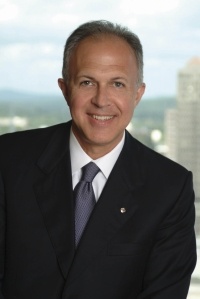c. 2008 Religion News Service
(UNDATED) When Carl Anderson publicly rebuked Sen. Joe Biden last month for opposing the Catholic Church’s stance on abortion, Anderson said he was speaking “on behalf of the 1.28 million” Knights of Columbus in the U.S.
Everyone, that is, except for Knights like Rick Gebhard of Manistee, Mich.
Gebhard, a 36-year-old public school teacher, says he founded Knights for Obama early this month to counter Anderson’s “tacit endorsement” of Republican presidential candidate Sen. John McCain.
Gebhard now says he’s been told he will likely be booted from the Catholic fraternal organization. The group’s rules forbid members from endorsing political candidates, said Knights of Columbus spokesman Patrick Korten.
Gebhard, a member of the Boston-based group Catholic Democrats, counts himself part of a resurgent Catholic Left that’s finding its voice during the 2008 presidential campaign. After struggling to be heard four years ago, when conservatives dominated the “values” debate and a majority of Catholics voted for President Bush, progressives say they have returned to the political arena this year with more supporters, deeper pockets and sharper ideas.
“We’ve been playing catch-up,” said Chris Korzen, executive director of Catholics United, a progressive online community that has grown from two volunteers with $1,000 and dorm-room headquarters in 2004 to now include 30,000 members and a $200,000 budget.
“And I think we’ve done it, to a great extent.”
Hoping to reach Catholics who are upset with the Bush administration, groups like Catholics United are posting billboards in swing states, papering Catholic households with mailers and flooding the airwaves with progressive messages on everything from abortion to home foreclosures.
Lay Catholics like Gebhard are resisting church pressure to make abortion the primary issue that should drive Catholics’ votes, and also pushing back when high-profile Catholics like Anderson single out Democrats like Biden for public criticism.
“I thought it was an overtly partisan maneuver,” Gebhard said of Anderson’s rebuke.
Anderson, the Supreme Knight of the Knights of Columbus, regularly speaks for the group on public policy issues, and, despite his background in GOP politics, steers clear of partisanship, Korten said.
Since Gebhard started his group on Oct. 3, between 50 and 100 fellow Knights _ including former Massachusetts Lt. Gov. Thomas P. O’Neill III _ have joined Knights for Obama.
The newly revived Catholic Left is part of a larger effort by religious progressives to expand the definition of “values issues” to include war, the economy and the environment.
“I think the `values’ debate was fairly one-dimensional,” said Alexia Kelley, executive director of Catholics in Alliance for the Common Good, which drew some 800 social-justice-minded Catholics to a meeting in Philadelphia last July and has been active during the presidential campaign.
Progressives say neutralizing abortion as a Republican wedge issue is key to their campaign. While many accept the church’s teaching that abortion is evil, they reject the idea that voting for a pro-abortion rights candidate is akin to heresy.
“Coming out of 2004, the abortion issue was paralyzing the prophetic religious community,” said James Salt, Catholic United’s director of organizing. “Our contribution to the abortion debate was inadequate.”
Progressives say they now have a persuasive contribution: that addressing the root causes of abortion, such as poverty, can be more effective in the short term than working to criminalize the procedure. Salt said his group is mailing that message directly to 50,000 Catholic families in Ohio and Pennsylvania.
Perhaps as important are the prominent Catholic scholars taking the message to the public at large, such as Douglas Kmiec, former legal counsel in the administrations of President Ronald Reagan and the first President George Bush and Nicholas Cafardi, former dean of the Law School of Duquesne University in Pittsburgh, and a past chairman of the U.S. Conference of Catholic Bishops’ National Review Board on clergy sexual abuse.
“When a very articulate conservative like Doug Kmiec all of a sudden lays out this case, you can’t say it’s ideologically motivated,” said Patrick Whelan, director of Catholic Democrats. “People stop and pay attention.”
Still, a number of Catholic bishops reject progressives’ arguments.
“The so-called `new’ approach of groups like Catholics United and Catholics in Alliance for the Common Good doesn’t seem to take into account that children continue to be killed every day through abortion,” said Archbishop Charles Chaput of Denver, who has published and spoken widely on religion and politics.
Overturning Roe v. Wade, the 1973 Supreme Court decision that legalized abortion, “remains an important and attainable goal,” Chaput said. “But the priority has always been legal protection for the unborn child and legal restriction on abortion, however that can be accomplished.”
Despite opposing progressives’ ideas, some conservatives say their ideological opponents have come a long way.
“Progressive Catholics have finally gotten their act together,” said Brian St. Paul, editor of Crisis Magazine and InsideCatholic.com. “They are more organized and effective. Certainly they are a force.”
KRE/RB END BURKE800 words
File photos of Anderson and Chaput are available via https://religionnews.com.





